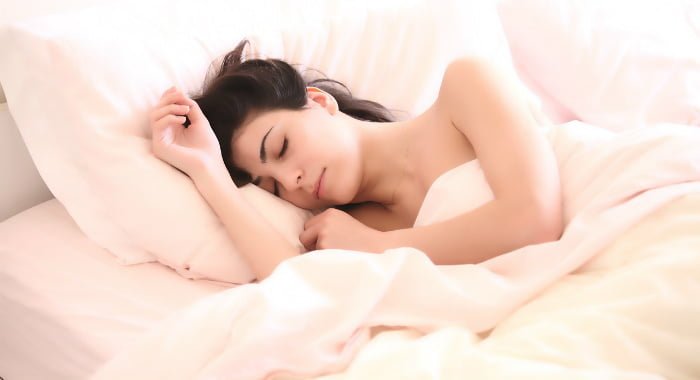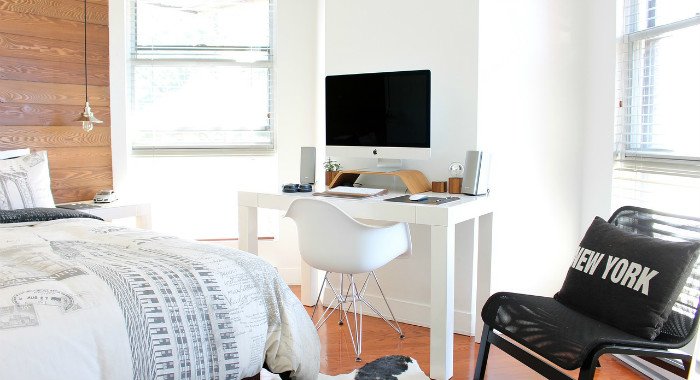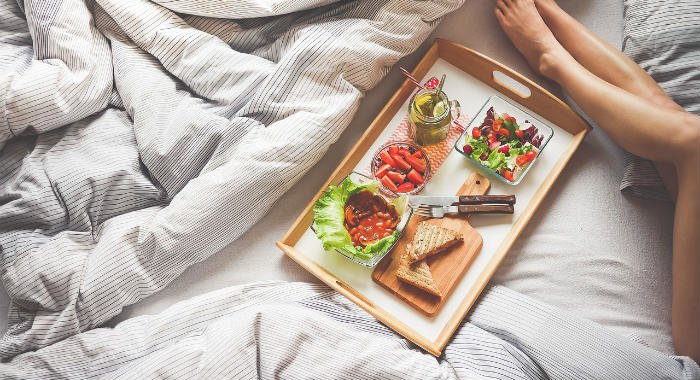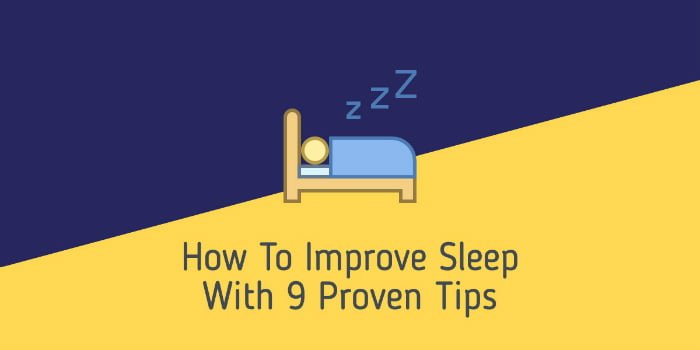Not getting enough sleep has a catastrophic effect on your health.
In the long term, it can lead to an increased risk of type 2 diabetes, cancer and even heart failure.
Even just missing a few hours can make you tired, grumpy and unable to concentrate. In my personal case, I spend most of the day fighting a nap and praying someone can put the kettle on for me. Everybody is different.
Unfortunately, a lack of sleep happens to all of us. In fact, a recent survey reported that only 16% of UK respondents felt like they got enough sleep at night.
Just 16%. That’s awful.
But we’re here to help change it, with our top tips on how to improve your sleep.
What causes poor sleep quality?
Before we dive headfirst into our tips, it’s important to understand how sleep works. After all, if you know what’s stopping you from getting your 8 hours, you can pick out the tips that will help you the most.
Generally, your sleep is controlled by two main systems, the circadian rhythm and the sleep drive.
The circadian rhythm is what’s known as your body’s biological clock. It uses natural light to let us know when it’s time for sleep and when it’s time to wake up in the morning, sending signals to the rest of your body to release the right sleep hormones at the right time.
Your sleep drive supports your circadian rhythm by increasing your desire for sleep. The longer you go without rest, the more tired you’ll feel.
Poor sleep quality is generally caused by a disruption of one of these sleep systems.
For example, if you work nights or if you’re exposed to a lot of unnatural lighting at night, your circadian rhythm will be disrupted. This makes it difficult for your body to regulate when you should be awake or asleep, making it difficult to get the correct amount of sleep that you need.
Unfortunately, there’s no easy fix or cure for sleep conditions. You can’t just wave a magic wand or use a potion that will make you instantly fall asleep at night.
But the good news is that most sleep disorders can be treated and eased with simple lifestyle changes and by creating bedtime routines.
Top 9 tips to improve your sleep

If you’re ready to start getting those ZZZs, let’s dive into our top tips on how to improve sleep.
1. Get some sunlight in the day
We’ve briefly mentioned how your circadian rhythm uses light to help regulate your sleep drive. So, one way to support this system is to get as much natural sunlight or bright light in the day.
In fact, a study found that even just 2 hours of bright light exposure in the day increased sleep efficiency by 80% and gave the participants 2 hours of extra sleep at night. That was from just 2 hours of sunlight a day.
The best way to get this light? Go outside and take a walk in the sun. This will also help increase your exercise levels, which can also improve your sleep (see tip 8!).
But living in the UK, we know this isn’t always possible, particularly in our grey and wet winters. If you can’t get outside consider investing in natural daylight lamps or bulbs to increase your light intake.
2. Limit your blue light at night
Boosting your circadian rhythm with light exposure means more light in the day and less at night. If you get too much light at night, you will confuse your system, making it think that it’s not time to send you to sleep yet.
This light exposure means that you won’t start creating the hormones you need to sleep, leaving you tossing and turning for hours. It’s the same reason that many people state that you shouldn’t use your mobile phone or watch TV at night.
This isn’t new news. Headlines like “Is your smartphone ruining your sleep?” have existed for years. But the reason that mobile phones and other screened devices have been deemed so dangerous for sleep is that they emit blue light.
So, if you want the best night’s sleep, you need to limit your exposure to blue light at night. This could include putting yourself on a ‘device ban’ near the time you need to go to sleep, using blue light filters installed in smartphones or even investing in a pair of blue light blocking glasses.
3. Stop napping

We’ve all had those days where you can’t help but feel your eyes shutting and your mind drifting off. But as tempting as an afternoon nap is, it’s something you need to try and get away from if you want a better quality of sleep at night.
This is because napping interferes with your sleep drive. Think of it almost like snacking during the day. The more you do it, the more you’ll ruin your appetite. So when it comes time for that big meal, you’re not hungry enough for it anymore.
The more you nap, the lower your sleep drive is. This prevents you from feeling tired at night, stopping your body from getting the signals it needs to begin producing the sleep hormones you need.
Can’t resist that nap? Reduce the impact they have on your night by:
- Keeping your naps short. If you limit your naps to 10-20 minutes, the less damage you’ll create to your sleep drive. In addition, you’re much less likely to feel tired and groggy after waking up if you keep your naps short.
- Not napping after 3 pm. The later in the day you nap, the worse your night will be. So try and keep your naps to the early afternoon.
Unfortunately, napping depends on each individual. Some find that napping will have no effect on their sleep at night, while others found that daytime naps made them feel sleepier and gave them worse quality sleep at night.
You’ve got to find the balance that’s right for you. But if you’re struggling, see how cutting out that daytime nap effects you.
4. Make a routine and stick to it
Here’s another one to help your circadian rhythm: set yourself a routine and stick to it.
Why? Because the more inconsistent your sleep is, the harder your body has to work to try and regulate your schedule. That’s why people who went to bed late on the weekend and had irregular sleeping patterns reported poor sleep quality.
In order to give your circadian rhythm a helping hand, you should aim to wake up at a consistent time every single day.
Now, don’t confuse setting up a routine as a strict sleep schedule. This doesn’t mean you have to be in bed by 9 pm sharp every night and up at 5 am every morning. It doesn’t work like that.
In fact, setting yourself a strict bedtime can make your quality of sleep worse by letting you lay there for hours and worry. So, get up. Move about and go to bed when you feel tired. But force yourself to wake up at the same time every day.
Over time, your body will naturally adjust and fall into a cycle where you feel tired at roughly the same time each evening and will want to wake up naturally in the morning.
5. Clear any distractions from your room

People fall asleep faster if the room is quiet, clean and dark. These are the optimum conditions that you need for a restful sleep.
So, try to remove as much noise and light as possible. Blackout blinds are great for creating a fully dark room and ear defenders are a good shout for those who live in particularly noisy areas.
Removing distractions will also help your mind shut off for the night. For example, if you’ve been having a stressful time at work and sleep with your laptop in the room, you’ll be reminded of the stress that you’re facing. Which means you’ll stay up for longer thinking about all the tasks you need to do – and may even get up to try and cross some off your list instead.
Out of sight is out of mind. If you keep your room clean and free, you’ll have an easier time falling asleep.
Plus, those that tend to do more leisure activities in bed, such as reading or watching TV will also find it harder to fall asleep. That’s because your body associates the room with these activities, rather than the place for you to fall asleep.
If you want the best night’s sleep, clear your room of any distractions and get used to only going to bed when it’s time to sleep.
6. Pick out the right mattress for you
If you want to get the best night’s sleep, you need to ensure you’ve got the right equipment for the job. This means investing in the mattress you need for a soundless sleep.
Mattresses have a big impact on the quality of your sleep. That’s because the right mattresses are designed to fully support your body and muscles through the night, preventing you from any sore muscles or back pain in the morning.
Without this support, the flow of blood is reduced. This is what causes pain and tells your body to roll over during the night, interrupting your sleep.
Old mattresses can also cause allergies by becoming infected with dust mites. This happens because the dust mites feed on the dead skin cells that you shed every single night. So, the longer you have a mattress, the more likely you are to attract dust mites. Yuck.
It’s currently recommended to replace your mattress every 8 years. But if you’re waking up with pain, a cough, or sore eyes – or even just finding it uncomfortable, you might be due an upgrade.
Our top-rated online mattresses:
| Mattress Brand | Type | Firmness | Our Rating | Review | Official Site |
|---|---|---|---|---|---|
 | Memory Foam | Medium-Firm | 9.7 | Read Review | Visit Website |
 | Memory Foam | Medium-Firm | 9.5 | Read Review | Visit Website |
 | Hybrid | Medium-Firm | 9.4 | Read Review | Visit Website |
7. Keep it cool

If you’ve ever laid awake during the summer months, you’ll know that temperature plays a key role in falling asleep. In fact, one study found that temperature affected sleep quality more than external noise.
If you want the best night’s sleep, The Sleep Council recommends an optimum temperature between 16-18°C.
8. Exercise regularly
Regular exercise has a massive impact on your health and can even improve the sleep you get at night. In fact, one study found that exercise halved the time it took to fall asleep and gave participants 41 more minutes of sleep at night.
Just make sure you don’t exercise too close to bedtime, as it releases hormones like epinephrine and adrenaline which help awake and alert.
9. Clear your mind with mindfulness
Worrying or replaying old thoughts in your mind is one sure way to prevent yourself from drifting off. But the more you try not to think about them, the harder they are to ignore.
It’s like putting a big red button in front of people with the sign ‘Don’t touch’. It’s irresistible.
But there is a way of clearing your mind with relaxation techniques. Relaxation techniques have been shown to improve sleep quality and help treat insomnia.
One exercise to help clear your mind is called noting.
Noting is where you simply take a note of the thoughts you’re having without interacting with them. This helps you stop being distracted by your thoughts, making it easier to turn off for a good night’s sleep. You can find out more about the noting technique here.
Does food affect sleep?

Certain food and drink can have a big impact on your sleep.
One of the most well-known examples is caffeine, which blocks a chemical called adenosine in your brain. Adenosine is responsible for making you feel tired, which is one of your body’s natural ways of letting you know that it’s time to get some sleep.
Caffeine blocks the effects of adenosine, so you don’t feel as tired.
Drinking caffeine doesn’t replace your sleep. Your body still needs it just as much as it did before. The only difference is that you no longer feel as tired – which can keep you lying awake at night.
Despite the stereotype (or even past experiences) of passing out blind drunk, alcohol is another drink that can negatively impact your sleep.
That’s because it’s more likely to increase symptoms of sleep apnea, snoring or fractured sleep patterns. This means you’re more likely to wake yourself up in the middle of the night and sleep tired, groggy and unrested come the morning.
In addition, alcohol also alters how much melatonin your body produces. This disrupts your circadian rhythm, making it harder to regulate your sleep.
Controlling sleep with your diet
People who have a diet that’s high in sugar may also have a difficult time sleeping. This is because your blood sugar levels will rise, giving your body a new wave of energy to keep you going.
If you want to get a good night’s sleep, it’s recommended to cut out the sugary snacks, caffeine and alcohol, particularly before bedtime.
These aren’t the only foods that impact your sleep though. There are foods you can have for a better night.
If you want to give yourself the best night’s sleep possible, you can increase your intake of melatonin through certain foods. For example, foods like turkey contain tryptophan, which is an amino acid that increases the production melatonin.
If snacking on fruit is more to your liking, tart cherries, bananas, pineapple and oranges are also rich in melatonin, which can help regulate your sleep.
Can medication help you sleep better?
Over the counter and prescription sleeping medication can help you fall asleep quickly and easily. But they don’t come without side effects.
Sleeping pills are best suited to short term use and helping you get through short periods of insomnia. But if you want better sleep in the long-term, life-style changes are shown to have better results – without the risk of you becoming addicted to sleeping medication.
There are exceptions to this. Some sleeping conditions such as narcolepsy and sleep apnea can be eased with medication, giving you better quality sleep.
The key to improving your sleep
If you want to keep your health in tip-top condition, you need to get enough sleep.
The key to improving your sleep is through lifestyle changes that help your sleep drive and circadian rhythm carry out their job of regulating your sleep cycle. This includes increasing your sunlight in the day and reducing your blue light at night.
Better sleep also includes avoiding foods and drinks that interfere with your cycle and giving yourself a clean, cool and comfortable environment to fall asleep in.
By following these tips, you’ll be on your way to a soundless night in no time at all.
